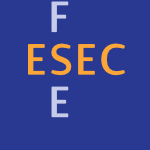141 papers:
 HT-2015-ChongDL #code review
HT-2015-ChongDL #code review- Did You Expect Your Users to Say This?: Distilling Unexpected Micro-reviews for Venue Owners (WHC, BTD, EPL), pp. 13–22.
 ICALP-v1-2015-HuangL #approximate #combinator #optimisation #probability #problem
ICALP-v1-2015-HuangL #approximate #combinator #optimisation #probability #problem- Approximating the Expected Values for Combinatorial Optimization Problems over Stochastic Points (LH, JL), pp. 910–921.
 ICALP-v1-2015-KaniewskiLW #complexity #query
ICALP-v1-2015-KaniewskiLW #complexity #query- Query Complexity in Expectation (JK, TL, RdW), pp. 761–772.
 FM-2015-QuatmannJDWAKB
FM-2015-QuatmannJDWAKB- Counterexamples for Expected Rewards (TQ, NJ, CD, RW, EÁ, JPK, BB), pp. 435–452.
 CHI-2015-ValtchanovH #feedback #named
CHI-2015-ValtchanovH #feedback #named- EnviroPulse: Providing Feedback about the Expected Affective Valence of the Environment (DV, MSH), pp. 2073–2082.
 CSCW-2015-OlteanuVC #social #social media #what
CSCW-2015-OlteanuVC #social #social media #what- What to Expect When the Unexpected Happens: Social Media Communications Across Crises (AO, SV, CC), pp. 994–1009.
 DUXU-IXD-2015-WalterKWAB #adaptation #question #recommendation #what
DUXU-IXD-2015-WalterKWAB #adaptation #question #recommendation #what- What Are the Expectations of Users of an Adaptive Recommendation Service Which Aims to Reduce Driver Distraction? (NW, BK, CW, TA, KB), pp. 517–528.
 ICEIS-v2-2015-SarinhoLS #dataset #linked data #open data #question
ICEIS-v2-2015-SarinhoLS #dataset #linked data #open data #question- Can You Find All the Data You Expect in a Linked Dataset? (WTS, BFL, DS), pp. 648–655.
 QAPL-2015-AldiniB #automaton #markov #similarity
QAPL-2015-AldiniB #automaton #markov #similarity- Expected-Delay-Summing Weak Bisimilarity for Markov Automata (AA, MB), pp. 1–15.
 FoSSaCS-2014-Mio #calculus #similarity #μ-calculus
FoSSaCS-2014-Mio #calculus #similarity #μ-calculus- Upper-Expectation Bisimilarity and Łukasiewicz μ-Calculus (MM), pp. 335–350.
 SAS-2014-ChakarovS #fixpoint #invariant #probability
SAS-2014-ChakarovS #fixpoint #invariant #probability- Expectation Invariants for Probabilistic Program Loops as Fixed Points (AC, SS), pp. 85–100.
 CHI-2014-DownsVHLS #experience #game studies #social
CHI-2014-DownsVHLS #experience #game studies #social- Audience experience in social videogaming: effects of turn expectation and game physicality (JD, FV, SH, SL, WS), pp. 3473–3482.
 DUXU-ELAS-2014-DysonJ #interface #question #what
DUXU-ELAS-2014-DysonJ #interface #question #what- Examining the Interfaces to E-journal Articles: What Do Users Expect? (MCD, EMJ), pp. 164–172.
 ECIR-2014-Aly #normalisation #parametricity #using
ECIR-2014-Aly #normalisation #parametricity #using- Score Normalization Using Logistic Regression with Expected Parameters (RA), pp. 579–584.
 ECIR-2014-GaoWO #comparison #using
ECIR-2014-GaoWO #comparison #using- Reducing Reliance on Relevance Judgments for System Comparison by Using Expectation-Maximization (NG, WW, DWO), pp. 1–12.
 ICML-c1-2014-CicaleseLS #optimisation #testing
ICML-c1-2014-CicaleseLS #optimisation #testing- Diagnosis determination: decision trees optimizing simultaneously worst and expected testing cost (FC, ESL, AMS), pp. 414–422.
 SIGIR-2014-RaiberK #predict
SIGIR-2014-RaiberK #predict- Query-performance prediction: setting the expectations straight (FR, OK), pp. 13–22.
 SAC-2014-BaeCPJKC #clustering #effectiveness #memory management
SAC-2014-BaeCPJKC #clustering #effectiveness #memory management- An effective data clustering method based on expected update time in flash memory environment (DHB, JWC, SMP, BSJ, SWK, SjC), pp. 1492–1497.
 ITiCSE-WGR-2013-UttingTMTBFPCKS #education #fresh look #performance
ITiCSE-WGR-2013-UttingTMTBFPCKS #education #fresh look #performance- A fresh look at novice programmers’ performance and their teachers’ expectations (IU, AET, MM, LT, DJB, RF, JHP, MEC, YBDK, JS, TW), pp. 15–32.
 STOC-2013-KingS #polynomial
STOC-2013-KingS #polynomial- Byzantine agreement in polynomial expected time: [extended abstract] (VK, JS), pp. 401–410.
 CIAA-2013-HolzerJ #algorithm #robust
CIAA-2013-HolzerJ #algorithm #robust- Brzozowski’s Minimization Algorithm — More Robust than Expected — (Extended Abstract) (MH, SJ), pp. 181–192.
 CSCW-2013-Al-AniBWTKMRP #developer #distributed #process #trust
CSCW-2013-Al-AniBWTKMRP #developer #distributed #process #trust- Globally distributed system developers: their trust expectations and processes (BAA, MJB, YW, ET, BK, SM, DFR, RP), pp. 563–574.
 CSCW-2013-QuinonesTL #design
CSCW-2013-QuinonesTL #design- Appropriation by unanticipated users: looking beyond design intent and expected use (PAQ, SDT, SL), pp. 1515–1526.
 ECIR-2013-LeelanupabZJ #question #rank
ECIR-2013-LeelanupabZJ #question #rank- Is Intent-Aware Expected Reciprocal Rank Sufficient to Evaluate Diversity? (TL, GZ, JMJ), pp. 738–742.
 ECIR-2013-YatesG #detection #named #social #social media
ECIR-2013-YatesG #detection #named #social #social media- ADRTrace: Detecting Expected and Unexpected Adverse Drug Reactions from User Reviews on Social Media Sites (AY, NG), pp. 816–819.
 KDD-2013-AltinigneliPB #parallel #using
KDD-2013-AltinigneliPB #parallel #using- Massively parallel expectation maximization using graphics processing units (MCA, CP, CB), pp. 838–846.
 RecSys-2013-ShiKBLH #multi #named #optimisation #rank
RecSys-2013-ShiKBLH #multi #named #optimisation #rank- xCLiMF: optimizing expected reciprocal rank for data with multiple levels of relevance (YS, AK, LB, ML, AH), pp. 431–434.
 REFSQ-2013-PhilippoHKCB #ambiguity #empirical #evaluation
REFSQ-2013-PhilippoHKCB #ambiguity #empirical #evaluation- Requirement Ambiguity Not as Important as Expected — Results of an Empirical Evaluation (EJP, WH, BK, MRVC, DMB), pp. 65–79.
 ICSE-2013-BacchelliB #bibliography #challenge #code review #perspective
ICSE-2013-BacchelliB #bibliography #challenge #code review #perspective- Expectations, outcomes, and challenges of modern code review (AB, CB), pp. 712–721.
 ICALP-v2-2012-BrazdilKNW #markov #process #termination
ICALP-v2-2012-BrazdilKNW #markov #process #termination- Minimizing Expected Termination Time in One-Counter Markov Decision Processes (TB, AK, PN, DW), pp. 141–152.
 CHI-2012-Gaver #design #question #research #what
CHI-2012-Gaver #design #question #research #what- What should we expect from research through design? (WWG), pp. 937–946.
 CHI-2012-WangQTTC #experience
CHI-2012-WangQTTC #experience- Keep in touch: channel, expectation and experience (RW, FKHQ, DT, KST, ADC), pp. 139–148.
 CSCW-2012-XuB #case study #community #interactive #online #scalability #what
CSCW-2012-XuB #case study #community #interactive #online #scalability #what- What do you think?: a case study of benefit, expectation, and interaction in a large online critique community (AX, BPB), pp. 295–304.
 ECIR-2012-DaiPKA
ECIR-2012-DaiPKA- Extended Expectation Maximization for Inferring Score Distributions (KD, VP, EK, JAA), pp. 293–304.
 ICML-2012-BoukouvalasBC #process #using
ICML-2012-BoukouvalasBC #process #using- Gaussian Process Quantile Regression using Expectation Propagation (AB, RB, DC), p. 123.
 ICPR-2012-Goldstein #algorithm #detection #named
ICPR-2012-Goldstein #algorithm #detection #named- FastLOF: An Expectation-Maximization based Local Outlier detection algorithm (MG), pp. 2282–2285.
 SIGIR-2012-LimSG #on the #trade-off
SIGIR-2012-LimSG #on the #trade-off- On the mathematical relationship between expected n-call@k and the relevance vs. diversity trade-off (KWL, SS, SG), pp. 1117–1118.
 SIGIR-2012-LogachevS #optimisation #parametricity #rank
SIGIR-2012-LogachevS #optimisation #parametricity #rank- Optimizing parameters of the expected reciprocal rank (YL, PS), pp. 1123–1124.
 DATE-2011-JhaLMR #simulation #statistics #trade-off #verification
DATE-2011-JhaLMR #simulation #statistics #trade-off #verification- When to stop verification?: Statistical trade-off between expected loss and simulation cost (SKJ, CJL, SM, SR), pp. 1309–1314.
 ICPC-2011-SamaraweeraSQ #approach #programming #towards
ICPC-2011-SamaraweeraSQ #approach #programming #towards- Programming from the Reader’s Perspective: Toward an Expectations Approach (GS, MS, JQ), pp. 211–212.
 CHI-2011-PaldaniusKVJH #case study #communication #experience #interactive
CHI-2011-PaldaniusKVJH #case study #communication #experience #interactive- Communication technology for human-dog interaction: exploration of dog owners’ experiences and expectations (MP, TK, KVVM, OJ, JH), pp. 2641–2650.
 DUXU-v1-2011-AuingerAKH #design #difference #question #web
DUXU-v1-2011-AuingerAKH #design #difference #question #web- Conformity with User Expectations on the Web: Are There Cultural Differences for Design Principles? (AA, AMA, HK, AH), pp. 3–12.
 DUXU-v1-2011-Kreichgauer #standard
DUXU-v1-2011-Kreichgauer #standard- ISO Standards for Standard Software: Accountability, Customer Expectations and Reality (UK), pp. 148–153.
 DUXU-v2-2011-TsaoCY #case study #design #image
DUXU-v2-2011-TsaoCY #case study #design #image- A Study on the Expected Image and Relevant Design Techniques in Different Product-Use Stages (YCT, BC, YPY), pp. 655–663.
 HCI-DDA-2011-EstevesA #agile #concept #design #development #interactive
HCI-DDA-2011-EstevesA #agile #concept #design #development #interactive- Designing Interaction Concepts, Managing Customer Expectation and Mastering Agile Development in Rich Application Product Development (ME, VA), pp. 54–62.
 CIKM-2011-JatowtY #scalability
CIKM-2011-JatowtY #scalability- Extracting collective expectations about the future from large text collections (AJ, CmAY), pp. 1259–1264.
 CIKM-2011-SannerGGKK #optimisation #retrieval #topic
CIKM-2011-SannerGGKK #optimisation #retrieval #topic- Diverse retrieval via greedy optimization of expected 1-call@k in a latent subtopic relevance model (SS, SG, TG, SK, SK), pp. 1977–1980.
 ICML-2011-BarthelmeC #named
ICML-2011-BarthelmeC #named- ABC-EP: Expectation Propagation for Likelihoodfree Bayesian Computation (SB, NC), pp. 289–296.
 SIGIR-2011-LiuB
SIGIR-2011-LiuB- Search task difficulty: the expected vs. the reflected (JL, NJB), pp. 1183–1184.
 VLDB-2010-TranMDPL #data type #nondeterminism
VLDB-2010-TranMDPL #data type #nondeterminism- Conditioning and Aggregating Uncertain Data Streams: Going Beyond Expectations (TTLT, AM, YD, LP, AL), pp. 1302–1313.
 PASTE-2010-Rubio-GonzalezL #documentation #fault
PASTE-2010-Rubio-GonzalezL #documentation #fault- Expect the unexpected: error code mismatches between documentation and the real world (CRG, BL), pp. 73–80.
 IFM-2010-FranzleTE #hybrid #probability #smt
IFM-2010-FranzleTE #hybrid #probability #smt- Satisfaction Meets Expectations — Computing Expected Values of Probabilistic Hybrid Systems with SMT (MF, TT, AE), pp. 168–182.
 CIKM-2010-YilmazSCR #evaluation #web
CIKM-2010-YilmazSCR #evaluation #web- Expected browsing utility for web search evaluation (EY, MS, NC, SR), pp. 1561–1564.
 ECIR-2010-AnderkaSP #bound #similarity #why
ECIR-2010-AnderkaSP #bound #similarity #why- Cross-Language High Similarity Search: Why No Sub-linear Time Bound Can Be Expected (MA, BS, MP), pp. 640–644.
 ICPR-2010-MemonLM #modelling #verification
ICPR-2010-MemonLM #modelling #verification- Information Theoretic Expectation Maximization Based Gaussian Mixture Modeling for Speaker Verification (SM, ML, NCM), pp. 4536–4540.
 ICPR-2010-WangM #learning #order #process #using
ICPR-2010-WangM #learning #order #process #using- Gaussian Process Learning from Order Relationships Using Expectation Propagation (RW, SJM), pp. 605–608.
 KEOD-2010-GillespieSC #case study #composition #modelling
KEOD-2010-GillespieSC #case study #composition #modelling- Satisfying user Expectations in Ontology-driven Compositional Systems — A Case Study in Fish Population Modeling (MGG, DAS, SSC), pp. 133–143.
 SIGIR-2010-LongCZCZT #learning #optimisation #ranking
SIGIR-2010-LongCZCZT #learning #optimisation #ranking- Active learning for ranking through expected loss optimization (BL, OC, YZ, YC, ZZ, BLT), pp. 267–274.
 QAPL-2010-NdukwuMc #abstraction #approach #independence #probability #source code
QAPL-2010-NdukwuMc #abstraction #approach #independence #probability #source code- An expectation transformer approach to predicate abstraction and data independence for probabilistic programs (UN, AM), pp. 129–143.
 PODS-2009-GuhaM #clustering #nondeterminism
PODS-2009-GuhaM #clustering #nondeterminism- Exceeding expectations and clustering uncertain data (SG, KM), pp. 269–278.
 ITiCSE-2009-HabermanY #development #self #student
ITiCSE-2009-HabermanY #development #self #student- Long-term software projects development: the affect of students’ self-appreciation and initial expectations (BH, CY), p. 363.
 FM-2009-HasanAATA #random #reasoning
FM-2009-HasanAATA #random #reasoning- Formal Reasoning about Expectation Properties for Continuous Random Variables (OH, NA, BA, ST, RA), pp. 435–450.
 HCD-2009-ProppF #behaviour #testing #usability
HCD-2009-ProppF #behaviour #testing #usability- Defining Expected Behavior for Usability Testing (SP, PF), pp. 110–119.
 HIMI-DIE-2009-VenkatacharyaRB #design #generative
HIMI-DIE-2009-VenkatacharyaRB #design #generative- Designing for the Next Generation: Generation-Y Expectations (PSV, SR, LB), pp. 190–196.
 CIKM-2009-ChapelleMZG #rank
CIKM-2009-ChapelleMZG #rank- Expected reciprocal rank for graded relevance (OC, DM, YZ, PG), pp. 621–630.
 ICML-2009-BusettoOB
ICML-2009-BusettoOB- Optimized expected information gain for nonlinear dynamical systems (AGB, CSO, JMB), pp. 97–104.
 ICML-2009-VolkovsZ #learning #named #ranking
ICML-2009-VolkovsZ #learning #named #ranking- BoltzRank: learning to maximize expected ranking gain (MV, RSZ), pp. 1089–1096.
 SAC-2009-BakkerI
SAC-2009-BakkerI- Web-services in the dutch healthcare insurance sector: expected versus achieved benefits (HB, MEI), pp. 1617–1618.
 DAC-2008-SparksWBLCPHR #industrial #what
DAC-2008-SparksWBLCPHR #industrial #what- Election year: what the electronics industry needs---and can expect---from the incoming administration (TS, PW, LB, RL, TC, CP, VH, CR), pp. 76–77.
 ICALP-A-2008-CheboluFM #graph #random
ICALP-A-2008-CheboluFM #graph #random- Finding a Maximum Matching in a Sparse Random Graph in O(n) Expected Time (PC, AMF, PM), pp. 161–172.
 CHI-2008-TsengH #adaptation #visual notation
CHI-2008-TsengH #adaptation #visual notation- The adaptation of visual search strategy to expected information gain (YCT, AH), pp. 1075–1084.
 ECIR-2008-ScholerSBT #using
ECIR-2008-ScholerSBT #using- Using Clicks as Implicit Judgments: Expectations Versus Observations (FS, MS, BB, AT), pp. 28–39.
 ICML-2008-SiggB
ICML-2008-SiggB- Expectation-maximization for sparse and non-negative PCA (CDS, JMB), pp. 960–967.
 SIGIR-2008-DruckMM #learning #using
SIGIR-2008-DruckMM #learning #using- Learning from labeled features using generalized expectation criteria (GD, GSM, AM), pp. 595–602.
 SAC-2008-Chen #energy
SAC-2008-Chen #energy- Expected energy consumption minimization in DVS systems with discrete frequencies (JJC), pp. 1720–1725.
 CASE-2007-KobetskiRAF #behaviour
CASE-2007-KobetskiRAF #behaviour- Minimization of Expected Cycle Time in Manufacturing Cells with Uncontrollable Behavior (AK, JR, KÅ, MF), pp. 14–19.
 SIGMOD-2007-GrustRT #off the shelf #why #xpath
SIGMOD-2007-GrustRT #off the shelf #why #xpath- Why off-the-shelf RDBMSs are better at XPath than you might expect (TG, JR, JT), pp. 949–958.
 HCI-IPT-2007-BasapurXAL #mobile
HCI-IPT-2007-BasapurXAL #mobile- User Expectations from Dictation on Mobile Devices (SB, SX, MA, YSL), pp. 217–225.
 ICML-2007-BryanMSS
ICML-2007-BryanMSS- Efficiently computing minimax expected-size confidence regions (BB, HBM, CMS, JGS), pp. 97–104.
 ICML-2007-MannM #learning #robust #scalability
ICML-2007-MannM #learning #robust #scalability- Simple, robust, scalable semi-supervised learning via expectation regularization (GSM, AM), pp. 593–600.
 SIGIR-2007-WuLW #probability #rank #ranking
SIGIR-2007-WuLW #probability #rank #ranking- Probability ranking principle via optimal expected rank (HCW, RWPL, KFW), pp. 713–714.
 FASE-2006-Sacha #evaluation #quality
FASE-2006-Sacha #evaluation #quality- Evaluation of Expected Software Quality: A Customer’s Viewpoint (KS), pp. 170–183.
 ICALP-v1-2006-Coja-OghlanL #graph #random
ICALP-v1-2006-Coja-OghlanL #graph #random- The Spectral Gap of Random Graphs with Given Expected Degrees (ACO, AL), pp. 15–26.
 CHI-2006-PearsonHBPN #adaptation #behaviour #how #human-computer #word
CHI-2006-PearsonHBPN #adaptation #behaviour #how #human-computer #word- Adaptive language behavior in HCI: how expectations and beliefs about a system affect users’ word choice (JP, JH, HPB, MJP, CN), pp. 1177–1180.
 SIGIR-2006-BetsiLTT #retrieval #xml
SIGIR-2006-BetsiLTT #retrieval #xml- User expectations from XML element retrieval (SB, ML, AT, TT), pp. 611–612.
 SIGIR-2006-PiwowarskiD #evaluation #information retrieval #modelling #xml
SIGIR-2006-PiwowarskiD #evaluation #information retrieval #modelling #xml- Evaluation in (XML) information retrieval: expected precision-recall with user modelling (EPRUM) (BP, GD), pp. 260–267.
 SAC-2006-YiHCH #adaptation #incremental
SAC-2006-YiHCH #adaptation #incremental- Adaptive page-level incremental checkpointing based on expected recovery time (SY, JH, YC, JH), pp. 1472–1476.
 SPL-BOOK-2006-Mansell #case study #experience #reuse
SPL-BOOK-2006-Mansell #case study #experience #reuse- Experiences and Expectations Regarding the Introduction of Systematic Reuse in Small- and Medium-Sized Companies (JXM), pp. 91–124.
 ICML-2005-SalojarviPK #algorithm
ICML-2005-SalojarviPK #algorithm- Expectation maximization algorithms for conditional likelihoods (JS, KP, SK), pp. 752–759.
 SIGIR-2005-Chai #empirical
SIGIR-2005-Chai #empirical- Expectation of f-measures: tractable exact computation and some empirical observations of its properties (KMAC), pp. 593–594.
 LICS-2005-EsparzaKM #analysis #automaton #probability
LICS-2005-EsparzaKM #analysis #automaton #probability- Quantitative Analysis of Probabilistic Pushdown Automata: Expectations and Variances (JE, AK, RM), pp. 117–126.
 CSEET-2004-Milewski #human-computer #learning
CSEET-2004-Milewski #human-computer #learning- Software Engineers and HCI Practitioners Learning to Work Together: A Preliminary Look at Expectations (AEM), pp. 45–49.
 ICML-2004-QiMPG #automation #predict
ICML-2004-QiMPG #automation #predict- Predictive automatic relevance determination by expectation propagation (Y(Q, TPM, RWP, ZG).
 ICPR-v3-2004-GimelfarbFE #linear
ICPR-v3-2004-GimelfarbFE #linear- Expectation-Maximization for a Linear Combination of Gaussians (GLG, AAF, AEB), pp. 422–425.
 KR-2004-TranHH #reasoning
KR-2004-TranHH #reasoning- Observation Expectation Reasoning in Agent Systems (BVT, JH, MH), pp. 246–254.
 SEKE-2004-RazBSKF #automation #elicitation
SEKE-2004-RazBSKF #automation #elicitation- Automated Assistance for Eliciting User Expectations (OR, RBB, MS, PK, CF), pp. 80–85.
 CSEET-2003-RoscaTM #industrial
CSEET-2003-RoscaTM #industrial- In today’s software industry a software engineer is not only expected to successfully cope (DR, WMT, JM), pp. 129–139.
 STOC-2003-BeierV #polynomial #random
STOC-2003-BeierV #polynomial #random- Random knapsack in expected polynomial time (RB, BV), pp. 232–241.
 ICML-2003-SalakhutdinovRG #optimisation
ICML-2003-SalakhutdinovRG #optimisation- Optimization with EM and Expectation-Conjugate-Gradient (RS, STR, ZG), pp. 672–679.
 ICML-2003-Zhang #kernel #learning #metric #multi #representation #scalability #towards
ICML-2003-Zhang #kernel #learning #metric #multi #representation #scalability #towards- Learning Metrics via Discriminant Kernels and Multidimensional Scaling: Toward Expected Euclidean Representation (ZZ), pp. 872–879.
 VMCAI-2003-Monniaux #abstraction #using
VMCAI-2003-Monniaux #abstraction #using- Abstraction of Expectation Functions Using Gaussian Distributions (DM), pp. 161–173.
 ASE-2002-SchroederFK #automation #black box #generative #testing
ASE-2002-SchroederFK #automation #black box #generative #testing- Generating Expected Results for Automated Black-Box Testing (PJS, PF, BK), pp. 139–148.
 PODS-2002-ChuHG #optimisation #query #question #what
PODS-2002-ChuHG #optimisation #query #question #what- Least Expected Cost Query Optimization: What Can We Expect? (FCC, JYH, JG), pp. 293–302.
 WCRE-2002-AsencioCHL #automation #design pattern
WCRE-2002-AsencioCHL #automation #design pattern- Relating Expectations to Automatically Recovered Design Patterns (AA, SC, DH, EL), pp. 87–96.
 ICPR-v3-2002-JohnsonB #identification #metric
ICPR-v3-2002-JohnsonB #identification #metric- Relationship between Identification Metrics: Expected Confusion and Area Under a ROC Curve (AYJ, AFB), pp. 662–666.
 KR-2002-Shanahan #feedback #logic
KR-2002-Shanahan #feedback #logic- A Logical Account of Perception Incorporating Feedback and Expectation (MS), pp. 3–13.
 DATE-2001-LiuWHL #diagrams
DATE-2001-LiuWHL #diagrams- Binary decision diagram with minimum expected path length (YYL, KHW, TH, CLL), pp. 708–712.
 ITiCSE-2001-Jenkins01a #motivation
ITiCSE-2001-Jenkins01a #motivation- Motivation = value x expectancy (TJ), p. 174.
 IWPC-2001-OBrienB #comprehension
IWPC-2001-OBrienB #comprehension- Inference-Based and Expectation-Based Processing in Program Comprehension (MPO, JB), pp. 71–78.
 ICML-2001-IvanovBP
ICML-2001-IvanovBP- Expectation Maximization for Weakly Labeled Data (YAI, BB, AP), pp. 218–225.
 ICALP-2000-KrivelevichV #approximate #independence
ICALP-2000-KrivelevichV #approximate #independence- Approximating the Independence Number and the Chromatic Number in Expected Polynominal Time (MK, VHV), pp. 13–24.
 KDD-2000-DrummondH #representation
KDD-2000-DrummondH #representation- Explicitly representing expected cost: an alternative to ROC representation (CD, RCH), pp. 198–207.
 PODS-1999-ChuHS #optimisation #query
PODS-1999-ChuHS #optimisation #query- Least Expected Cost Query Optimization: An Exercise in Utility (FCC, JYH, PS), pp. 138–147.
 HCI-CCAD-1999-RahlffRHT
HCI-CCAD-1999-RahlffRHT- Context and expectations in teleconversations (OWR, RKR, JH, DVT), pp. 523–527.
 HCI-EI-1999-SanuiU #email #evaluation #grid
HCI-EI-1999-SanuiU #email #evaluation #grid- Extracting Baby-Boomers’ Future Expectations by the Evaluation Grid Method Through E-Mail (JS, MU), pp. 760–763.
 ICML-1999-SchefferJ #analysis #fault
ICML-1999-SchefferJ #analysis #fault- Expected Error Analysis for Model Selection (TS, TJ), pp. 361–370.
 RE-1999-BoehmAPKL #requirements
RE-1999-BoehmAPKL #requirements- Requirements Engineering, Expectations Management, and the Two Cultures (BWB, MAA, DP, JK, AL), pp. 14–22.
 ICPR-1998-Gimelfarb #interactive #modelling #question #segmentation #what
ICPR-1998-Gimelfarb #interactive #modelling #question #segmentation #what- Supervised segmentation by pairwise interactions: do Gibbs models learn what we expect? (GLG), pp. 817–819.
 IWTCS-1998-Ek #generative #state of the art #testing
IWTCS-1998-Ek #generative #state of the art #testing- Testing and Test Generation: State of the Art and Future Expectations (AE), pp. 293–306.
 LICS-1998-StarkS #analysis #automaton #composition #network #probability
LICS-1998-StarkS #analysis #automaton #composition #network #probability- Compositional Analysis of Expected Delays in Networks of Probabilistic I/O Automata (EWS, SAS), pp. 466–477.
 ICML-1997-Fiechter #bound #learning #online
ICML-1997-Fiechter #bound #learning #online- Expected Mistake Bound Model for On-Line Reinforcement Learning (CNF), pp. 116–124.
 SAC-1997-Li97a #execution #parallel #source code
SAC-1997-Li97a #execution #parallel #source code- Analyzing the expected execution times of parallel programs (KL), pp. 488–495.
 ESEC-FSE-1997-Uhl #industrial #what
ESEC-FSE-1997-Uhl #industrial #what- What we Expect from Software Engineers in the Industry (Abstract) (JU), p. 51.
 ICPR-1996-RaudysD #classification #empirical #fault
ICPR-1996-RaudysD #classification #empirical #fault- Expected error of minimum empirical error and maximal margin classifiers (SR, VD), pp. 875–879.
 ICALP-1995-NikoletseasRSY #graph #memory management #probability
ICALP-1995-NikoletseasRSY #graph #memory management #probability- Stochastic Graphs Have Short Memory: Fully Dynamic Connectivity in Poly-Log Expected Time (SEN, JHR, PGS, MY), pp. 159–170.
 AdaEurope-1993-WallABL #ada #performance #source code
AdaEurope-1993-WallABL #ada #performance #source code- Performance Expectations on Ada Programs (GW, LA, LB, KL), pp. 227–239.
 CSL-1992-BehrendtCG #approximate #optimisation #problem
CSL-1992-BehrendtCG #approximate #optimisation #problem- Optimization Problems: Expressibility, Approximation Properties and Expected Asymptotic Growth of Optimal Solutions (TB, KJC, EG), pp. 43–60.
 PODS-1991-SeshadriN #datalog #on the #query #recursion
PODS-1991-SeshadriN #datalog #on the #query #recursion- On the Expected Size of Recursive Datalog Queries (SS, JFN), pp. 268–279.
 ICALP-1991-BernEY
ICALP-1991-BernEY- The Expected Extremes in a Delaunay Triangulation (MWB, DE, FFY), pp. 674–685.
 KR-1991-Gardenfors
KR-1991-Gardenfors- Nonmonotonic Inferences Based on Expectations: A Preliminary Report (PG), pp. 585–590.
 NACLP-1989-Lin #backtracking #parallel #performance #random
NACLP-1989-Lin #backtracking #parallel #performance #random- Expected Performance of the Randomized Parallel Backtracking Method (ZL), pp. 677–696.
 DAC-1988-MadreB #behaviour #comparison #correctness #proving #using
DAC-1988-MadreB #behaviour #comparison #correctness #proving #using- Proving Circuit Correctness Using Formal Comparison Between Expected and Extracted Behaviour (JCM, JPB), pp. 205–210.
 SIGIR-1988-BollmannR #analysis
SIGIR-1988-BollmannR #analysis- A Utility-Theoretic Analysis of Expected Search Length (PB, VVR), pp. 245–256.
 SIGIR-1988-FuhrH #estimation #probability
SIGIR-1988-FuhrH #estimation #probability- Optimum Probability Estimation Based on Expectations (NF, HH), pp. 257–273.
 STOC-1985-BollobasS #algorithm #behaviour #on the #set
STOC-1985-BollobasS #algorithm #behaviour #on the #set- On the Expected Behaviour of Disjoint Set Union Algorithms (BB, IS), pp. 224–231.
 STOC-1985-Bracha #protocol #random
STOC-1985-Bracha #protocol #random- An O(lg n) Expected Rounds Randomized Byzantine Generals Protocol (GB), pp. 316–326.
 STOC-1984-BentleyJLMM #behaviour
STOC-1984-BentleyJLMM #behaviour- Some Unexpected Expected Behavior Results for Bin Packing (JLB, DSJ, FTL, CCM, LAM), pp. 279–288.
 STOC-1984-Clarkson #algorithm #approximate #geometry #performance
STOC-1984-Clarkson #algorithm #approximate #geometry #performance- Fast Expected-Time and Approximation Algorithms for Geometric Minimum Spanning Trees (Extended Abstract) (KLC), pp. 342–348.
 STOC-1980-Bloniarz #algorithm
STOC-1980-Bloniarz #algorithm- A Shortest-Path Algorithm with Expected Time O(n^2 log n log ^* n) (PAB), pp. 378–384.
 STOC-1980-KarpT #algorithm #linear #problem
STOC-1980-KarpT #algorithm #linear #problem- Linear Expected-Time Algorithms for Connectivity Problems (Extended Abstract) (RMK, RET), pp. 368–377.
 ICALP-1979-Janko
ICALP-1979-Janko- Hierarchic Index Sequential Search with Optimal Variable Block Size and Its Minimal Expected Number of Comparisons (WJ), pp. 304–315.
 HT-2015-ChongDL #code review
HT-2015-ChongDL #code review ICALP-v1-2015-HuangL #approximate #combinator #optimisation #probability #problem
ICALP-v1-2015-HuangL #approximate #combinator #optimisation #probability #problem ICALP-v1-2015-KaniewskiLW #complexity #query
ICALP-v1-2015-KaniewskiLW #complexity #query FM-2015-QuatmannJDWAKB
FM-2015-QuatmannJDWAKB CHI-2015-ValtchanovH #feedback #named
CHI-2015-ValtchanovH #feedback #named CSCW-2015-OlteanuVC #social #social media #what
CSCW-2015-OlteanuVC #social #social media #what DUXU-IXD-2015-WalterKWAB #adaptation #question #recommendation #what
DUXU-IXD-2015-WalterKWAB #adaptation #question #recommendation #what ICEIS-v2-2015-SarinhoLS #dataset #linked data #open data #question
ICEIS-v2-2015-SarinhoLS #dataset #linked data #open data #question QAPL-2015-AldiniB #automaton #markov #similarity
QAPL-2015-AldiniB #automaton #markov #similarity FoSSaCS-2014-Mio #calculus #similarity #μ-calculus
FoSSaCS-2014-Mio #calculus #similarity #μ-calculus SAS-2014-ChakarovS #fixpoint #invariant #probability
SAS-2014-ChakarovS #fixpoint #invariant #probability CHI-2014-DownsVHLS #experience #game studies #social
CHI-2014-DownsVHLS #experience #game studies #social DUXU-ELAS-2014-DysonJ #interface #question #what
DUXU-ELAS-2014-DysonJ #interface #question #what ECIR-2014-Aly #normalisation #parametricity #using
ECIR-2014-Aly #normalisation #parametricity #using ECIR-2014-GaoWO #comparison #using
ECIR-2014-GaoWO #comparison #using ICML-c1-2014-CicaleseLS #optimisation #testing
ICML-c1-2014-CicaleseLS #optimisation #testing SIGIR-2014-RaiberK #predict
SIGIR-2014-RaiberK #predict SAC-2014-BaeCPJKC #clustering #effectiveness #memory management
SAC-2014-BaeCPJKC #clustering #effectiveness #memory management ITiCSE-WGR-2013-UttingTMTBFPCKS #education #fresh look #performance
ITiCSE-WGR-2013-UttingTMTBFPCKS #education #fresh look #performance STOC-2013-KingS #polynomial
STOC-2013-KingS #polynomial CIAA-2013-HolzerJ #algorithm #robust
CIAA-2013-HolzerJ #algorithm #robust CSCW-2013-Al-AniBWTKMRP #developer #distributed #process #trust
CSCW-2013-Al-AniBWTKMRP #developer #distributed #process #trust CSCW-2013-QuinonesTL #design
CSCW-2013-QuinonesTL #design ECIR-2013-LeelanupabZJ #question #rank
ECIR-2013-LeelanupabZJ #question #rank ECIR-2013-YatesG #detection #named #social #social media
ECIR-2013-YatesG #detection #named #social #social media KDD-2013-AltinigneliPB #parallel #using
KDD-2013-AltinigneliPB #parallel #using RecSys-2013-ShiKBLH #multi #named #optimisation #rank
RecSys-2013-ShiKBLH #multi #named #optimisation #rank REFSQ-2013-PhilippoHKCB #ambiguity #empirical #evaluation
REFSQ-2013-PhilippoHKCB #ambiguity #empirical #evaluation ICSE-2013-BacchelliB #bibliography #challenge #code review #perspective
ICSE-2013-BacchelliB #bibliography #challenge #code review #perspective ICALP-v2-2012-BrazdilKNW #markov #process #termination
ICALP-v2-2012-BrazdilKNW #markov #process #termination CHI-2012-Gaver #design #question #research #what
CHI-2012-Gaver #design #question #research #what CHI-2012-WangQTTC #experience
CHI-2012-WangQTTC #experience CSCW-2012-XuB #case study #community #interactive #online #scalability #what
CSCW-2012-XuB #case study #community #interactive #online #scalability #what ECIR-2012-DaiPKA
ECIR-2012-DaiPKA ICML-2012-BoukouvalasBC #process #using
ICML-2012-BoukouvalasBC #process #using ICPR-2012-Goldstein #algorithm #detection #named
ICPR-2012-Goldstein #algorithm #detection #named SIGIR-2012-LimSG #on the #trade-off
SIGIR-2012-LimSG #on the #trade-off SIGIR-2012-LogachevS #optimisation #parametricity #rank
SIGIR-2012-LogachevS #optimisation #parametricity #rank DATE-2011-JhaLMR #simulation #statistics #trade-off #verification
DATE-2011-JhaLMR #simulation #statistics #trade-off #verification ICPC-2011-SamaraweeraSQ #approach #programming #towards
ICPC-2011-SamaraweeraSQ #approach #programming #towards CHI-2011-PaldaniusKVJH #case study #communication #experience #interactive
CHI-2011-PaldaniusKVJH #case study #communication #experience #interactive DUXU-v1-2011-AuingerAKH #design #difference #question #web
DUXU-v1-2011-AuingerAKH #design #difference #question #web DUXU-v1-2011-Kreichgauer #standard
DUXU-v1-2011-Kreichgauer #standard DUXU-v2-2011-TsaoCY #case study #design #image
DUXU-v2-2011-TsaoCY #case study #design #image HCI-DDA-2011-EstevesA #agile #concept #design #development #interactive
HCI-DDA-2011-EstevesA #agile #concept #design #development #interactive CIKM-2011-JatowtY #scalability
CIKM-2011-JatowtY #scalability CIKM-2011-SannerGGKK #optimisation #retrieval #topic
CIKM-2011-SannerGGKK #optimisation #retrieval #topic ICML-2011-BarthelmeC #named
ICML-2011-BarthelmeC #named SIGIR-2011-LiuB
SIGIR-2011-LiuB VLDB-2010-TranMDPL #data type #nondeterminism
VLDB-2010-TranMDPL #data type #nondeterminism PASTE-2010-Rubio-GonzalezL #documentation #fault
PASTE-2010-Rubio-GonzalezL #documentation #fault IFM-2010-FranzleTE #hybrid #probability #smt
IFM-2010-FranzleTE #hybrid #probability #smt CIKM-2010-YilmazSCR #evaluation #web
CIKM-2010-YilmazSCR #evaluation #web ECIR-2010-AnderkaSP #bound #similarity #why
ECIR-2010-AnderkaSP #bound #similarity #why ICPR-2010-MemonLM #modelling #verification
ICPR-2010-MemonLM #modelling #verification ICPR-2010-WangM #learning #order #process #using
ICPR-2010-WangM #learning #order #process #using KEOD-2010-GillespieSC #case study #composition #modelling
KEOD-2010-GillespieSC #case study #composition #modelling SIGIR-2010-LongCZCZT #learning #optimisation #ranking
SIGIR-2010-LongCZCZT #learning #optimisation #ranking QAPL-2010-NdukwuMc #abstraction #approach #independence #probability #source code
QAPL-2010-NdukwuMc #abstraction #approach #independence #probability #source code PODS-2009-GuhaM #clustering #nondeterminism
PODS-2009-GuhaM #clustering #nondeterminism ITiCSE-2009-HabermanY #development #self #student
ITiCSE-2009-HabermanY #development #self #student FM-2009-HasanAATA #random #reasoning
FM-2009-HasanAATA #random #reasoning HCD-2009-ProppF #behaviour #testing #usability
HCD-2009-ProppF #behaviour #testing #usability HIMI-DIE-2009-VenkatacharyaRB #design #generative
HIMI-DIE-2009-VenkatacharyaRB #design #generative CIKM-2009-ChapelleMZG #rank
CIKM-2009-ChapelleMZG #rank ICML-2009-BusettoOB
ICML-2009-BusettoOB ICML-2009-VolkovsZ #learning #named #ranking
ICML-2009-VolkovsZ #learning #named #ranking SAC-2009-BakkerI
SAC-2009-BakkerI DAC-2008-SparksWBLCPHR #industrial #what
DAC-2008-SparksWBLCPHR #industrial #what ICALP-A-2008-CheboluFM #graph #random
ICALP-A-2008-CheboluFM #graph #random CHI-2008-TsengH #adaptation #visual notation
CHI-2008-TsengH #adaptation #visual notation ECIR-2008-ScholerSBT #using
ECIR-2008-ScholerSBT #using ICML-2008-SiggB
ICML-2008-SiggB SIGIR-2008-DruckMM #learning #using
SIGIR-2008-DruckMM #learning #using SAC-2008-Chen #energy
SAC-2008-Chen #energy CASE-2007-KobetskiRAF #behaviour
CASE-2007-KobetskiRAF #behaviour SIGMOD-2007-GrustRT #off the shelf #why #xpath
SIGMOD-2007-GrustRT #off the shelf #why #xpath HCI-IPT-2007-BasapurXAL #mobile
HCI-IPT-2007-BasapurXAL #mobile ICML-2007-BryanMSS
ICML-2007-BryanMSS ICML-2007-MannM #learning #robust #scalability
ICML-2007-MannM #learning #robust #scalability SIGIR-2007-WuLW #probability #rank #ranking
SIGIR-2007-WuLW #probability #rank #ranking FASE-2006-Sacha #evaluation #quality
FASE-2006-Sacha #evaluation #quality ICALP-v1-2006-Coja-OghlanL #graph #random
ICALP-v1-2006-Coja-OghlanL #graph #random CHI-2006-PearsonHBPN #adaptation #behaviour #how #human-computer #word
CHI-2006-PearsonHBPN #adaptation #behaviour #how #human-computer #word SIGIR-2006-BetsiLTT #retrieval #xml
SIGIR-2006-BetsiLTT #retrieval #xml SIGIR-2006-PiwowarskiD #evaluation #information retrieval #modelling #xml
SIGIR-2006-PiwowarskiD #evaluation #information retrieval #modelling #xml SAC-2006-YiHCH #adaptation #incremental
SAC-2006-YiHCH #adaptation #incremental SPL-BOOK-2006-Mansell #case study #experience #reuse
SPL-BOOK-2006-Mansell #case study #experience #reuse ICML-2005-SalojarviPK #algorithm
ICML-2005-SalojarviPK #algorithm SIGIR-2005-Chai #empirical
SIGIR-2005-Chai #empirical LICS-2005-EsparzaKM #analysis #automaton #probability
LICS-2005-EsparzaKM #analysis #automaton #probability CSEET-2004-Milewski #human-computer #learning
CSEET-2004-Milewski #human-computer #learning ICML-2004-QiMPG #automation #predict
ICML-2004-QiMPG #automation #predict ICPR-v3-2004-GimelfarbFE #linear
ICPR-v3-2004-GimelfarbFE #linear KR-2004-TranHH #reasoning
KR-2004-TranHH #reasoning SEKE-2004-RazBSKF #automation #elicitation
SEKE-2004-RazBSKF #automation #elicitation CSEET-2003-RoscaTM #industrial
CSEET-2003-RoscaTM #industrial STOC-2003-BeierV #polynomial #random
STOC-2003-BeierV #polynomial #random ICML-2003-SalakhutdinovRG #optimisation
ICML-2003-SalakhutdinovRG #optimisation ICML-2003-Zhang #kernel #learning #metric #multi #representation #scalability #towards
ICML-2003-Zhang #kernel #learning #metric #multi #representation #scalability #towards VMCAI-2003-Monniaux #abstraction #using
VMCAI-2003-Monniaux #abstraction #using ASE-2002-SchroederFK #automation #black box #generative #testing
ASE-2002-SchroederFK #automation #black box #generative #testing PODS-2002-ChuHG #optimisation #query #question #what
PODS-2002-ChuHG #optimisation #query #question #what WCRE-2002-AsencioCHL #automation #design pattern
WCRE-2002-AsencioCHL #automation #design pattern ICPR-v3-2002-JohnsonB #identification #metric
ICPR-v3-2002-JohnsonB #identification #metric KR-2002-Shanahan #feedback #logic
KR-2002-Shanahan #feedback #logic DATE-2001-LiuWHL #diagrams
DATE-2001-LiuWHL #diagrams ITiCSE-2001-Jenkins01a #motivation
ITiCSE-2001-Jenkins01a #motivation IWPC-2001-OBrienB #comprehension
IWPC-2001-OBrienB #comprehension ICML-2001-IvanovBP
ICML-2001-IvanovBP ICALP-2000-KrivelevichV #approximate #independence
ICALP-2000-KrivelevichV #approximate #independence KDD-2000-DrummondH #representation
KDD-2000-DrummondH #representation PODS-1999-ChuHS #optimisation #query
PODS-1999-ChuHS #optimisation #query HCI-CCAD-1999-RahlffRHT
HCI-CCAD-1999-RahlffRHT HCI-EI-1999-SanuiU #email #evaluation #grid
HCI-EI-1999-SanuiU #email #evaluation #grid ICML-1999-SchefferJ #analysis #fault
ICML-1999-SchefferJ #analysis #fault RE-1999-BoehmAPKL #requirements
RE-1999-BoehmAPKL #requirements ICPR-1998-Gimelfarb #interactive #modelling #question #segmentation #what
ICPR-1998-Gimelfarb #interactive #modelling #question #segmentation #what IWTCS-1998-Ek #generative #state of the art #testing
IWTCS-1998-Ek #generative #state of the art #testing LICS-1998-StarkS #analysis #automaton #composition #network #probability
LICS-1998-StarkS #analysis #automaton #composition #network #probability ICML-1997-Fiechter #bound #learning #online
ICML-1997-Fiechter #bound #learning #online SAC-1997-Li97a #execution #parallel #source code
SAC-1997-Li97a #execution #parallel #source code ESEC-FSE-1997-Uhl #industrial #what
ESEC-FSE-1997-Uhl #industrial #what ICPR-1996-RaudysD #classification #empirical #fault
ICPR-1996-RaudysD #classification #empirical #fault ICALP-1995-NikoletseasRSY #graph #memory management #probability
ICALP-1995-NikoletseasRSY #graph #memory management #probability AdaEurope-1993-WallABL #ada #performance #source code
AdaEurope-1993-WallABL #ada #performance #source code CSL-1992-BehrendtCG #approximate #optimisation #problem
CSL-1992-BehrendtCG #approximate #optimisation #problem PODS-1991-SeshadriN #datalog #on the #query #recursion
PODS-1991-SeshadriN #datalog #on the #query #recursion ICALP-1991-BernEY
ICALP-1991-BernEY KR-1991-Gardenfors
KR-1991-Gardenfors NACLP-1989-Lin #backtracking #parallel #performance #random
NACLP-1989-Lin #backtracking #parallel #performance #random DAC-1988-MadreB #behaviour #comparison #correctness #proving #using
DAC-1988-MadreB #behaviour #comparison #correctness #proving #using SIGIR-1988-BollmannR #analysis
SIGIR-1988-BollmannR #analysis SIGIR-1988-FuhrH #estimation #probability
SIGIR-1988-FuhrH #estimation #probability STOC-1985-BollobasS #algorithm #behaviour #on the #set
STOC-1985-BollobasS #algorithm #behaviour #on the #set STOC-1985-Bracha #protocol #random
STOC-1985-Bracha #protocol #random STOC-1984-BentleyJLMM #behaviour
STOC-1984-BentleyJLMM #behaviour STOC-1984-Clarkson #algorithm #approximate #geometry #performance
STOC-1984-Clarkson #algorithm #approximate #geometry #performance STOC-1980-Bloniarz #algorithm
STOC-1980-Bloniarz #algorithm STOC-1980-KarpT #algorithm #linear #problem
STOC-1980-KarpT #algorithm #linear #problem ICALP-1979-Janko
ICALP-1979-Janko









